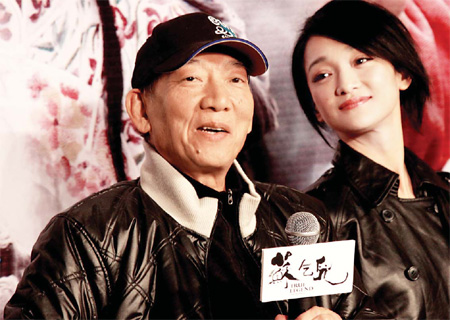Action man
By Liu Wei (China Daily)
Updated: 2010-01-14 09:07
 |
Large Medium Small |

Yuen Woo-ping created the fight scenes in The Matrix, Crouching Tiger, Hidden Dragon and many other action film masterpieces. He is now bringing 3-D kungfu to the silver screen. Liu Wei reports
If you met Yuen Woo-ping on the street you would probably not give him a second look. He looks like an ordinary 65-year-old man, short, slim and slightly hunched.
But he created the action scenes for The Matrix, Crouching Tiger, Hidden Dragon, Kill Bill and some of the most popular Hong Kong kungfu films such as Drunken Master and Iron Monkey.
That makes him extraordinary.
Yuen has been designing action scenes and directing kungfu films for 40 years, and created the kungfu comedy genre that made Jackie Chan an overnight star, as well as the martial artists' biopic idea, such as Jet Li's Huang Feihong series.
Now, he is planning to introduce 3-D kungfu.
True Legend (苏乞儿), directed by Yuen, is the world's first 3-D kungfu film.
"3-D has been really popular in Hollywood, so why not try it? Chinese films should not lag too far behind," he says. "The technology makes the action three-dimensional, which offers viewers more visual enjoyment. The power and beauty of kungfu will be crystal clear."
The film, to premiere on Feb 9, features authentic kungfu, accentuated by 3-D and computer-generated effects.
The two lead actors, Zhao Wenzhuo and pop icon Jay Chou, had no doubles. Zhao won various national kungfu contests before entering the film industry in the early 1990s; while Chou demonstrates his drunken fist style and various weapons, even though he had no previous kungfu training.
"I still believe in real kungfu," Yuen says. "It is the foundation. Technology only perfects it when it comes to the limitations of human bodies. I do not like those kungfu films in which people fly here and there."
This belief was challenged to the limit in Crouching Tiger, Hidden Dragon, in which Ang Lee wanted the film to be like a Chinese water-and-ink painting - light, fantastic and unearthly. That meant a lot of wires, which Yuen was not good at, or fond of.
Yuen says the scene where Chow Yun-fat and Zhang Ziyi fight in the bamboo forest was one of the most troublesome of his career.
"Ang Lee told me to fight on the bamboo. That one sentence killed me," he laughs.
For the scene the crew shot for five or six hours a day. Chow and Zhang spent one hour a day on the bamboo, while the rest of the time was spent testing the wires.
At one point Yuen could not help saying to Lee: "What do you want, fight or feel?"
"Can we fight out a feel?" was the answer.
The scene, of course, turned out to be one of the most impressive parts of the film.
While he has sometimes had a different vision from the directors he has worked with, Yuen says he has always followed their direction. But he also gave many suggestions to Lee, who, in his book, credits Yuen as one of the film's scriptwriters.
The success of Crouching Tiger, Hidden Dragon and The Matrix series made Yuen a sought after figure in Hollywood and he worked on Kill Bill and Danny the Dog, too.
But he prefers the working style in China.
"The system here is more flexible," he says. "Every department will lend a hand when needed, while in Hollywood you cannot intervene in others' work. They may complain to the labor union about that."
Yuen is also used to being spontaneous and some of his most praised scenes were created in this way. In Hollywood that is impossible, he says, as actors have to practice their action sequences months before filming starts and no changes are allowed on set.
"Also, in Hollywood they shoot only five or six takes a day and never work overtime. In making The Matrix, I once worked 1 minute over schedule and they asked me to stop," he recalls.
Crouching Tiger, Hidden Dragon and The Matrix made kungfu movies popular in Hollywood, but most of the Chinese stunt teams have returned to China.
Part of the reason for this, Yuen says, is the Hollywood stunt teams learned a lot from the Chinese. Also, since kungfu films are still most popular in China, the opportunities are here.
"Kungfu films are not at a low point. We still have a lot of work in the mainland and Hong Kong," he says. "And what Hollywood learned from us is not the cream of the cake. So I don't worry about losing work. I would like to cooperate with Hollywood again if the script is good."